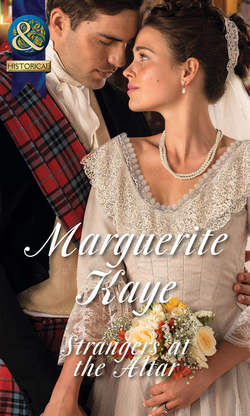Читать книгу Strangers at the Altar - Marguerite Kaye - Страница 11
ОглавлениеChapter Four
The sun shone weakly from a pale blue sky dotted with puffy clouds, the kind a child would paint. Following in Innes’s wake along the narrow path of damp paving slabs, Ainsley could see that the gloom inside the Home Farm’s lower rooms was largely due to the height of the untended hedge. Emerging through an extremely overgrown arch, she came face-to-face with Strone Bridge Castle for the first time.
They were standing at the side of a long sweep of carriageway with what must have been a huge lawn on either side, though at present it was more like the remnants of a hayfield, part long yellowed grass falling over, part fresh green pushing through. The building loomed over them, such an imposing structure she could not imagine how she had missed its hulk yesterday, though the stone was indeed the grey colour the sky had been.
Ainsley walked backwards to gain some perspective. ‘This is the rear of the house,’ Innes said. ‘The drive meets the main overland road, which cuts over to the other side of the peninsula and Loch Fyne, though to call it a road... It’s far easier to travel by boat in this neck of the woods.’
‘We did not come this way yesterday?’
He shook his head. ‘The front of the house faces down to the shore. We came up that way. I’ll show you, we’ll go in by the main entrance, but I wanted you to see the scale of this damned monstrosity first.’
Strone Bridge Castle was indeed enormous, and though it was not precisely charming, Ainsley would not have called it a monstrosity. An imposing construction with a large tower at each corner, and another central turret projecting from the middle of the main building, it was like a castle from a Gothic novel. The sturdy turrets had unexpected ogee roofs, adding a hint of the east into the architectural mix, each roof topped with tall spires and embellished with slit windows. The turrets looked, with their rugged masonry walls and stolid, defensive air, quite at odds with the central part of the building, which was considerably more elegant, mostly Jacobean in style, with four storeys of tall French-style windows, a low Palladian roof ornamented with a stone balustrade and a huge portico that looked as if it had been added on as an afterthought. The overall effect was certainly not of beauty, but it was striking.
‘It looks,’ Ainsley said, studying it with bemusement, ‘as if someone has jumbled up three or four different houses, or taken samples from a book of architectural styles through the ages.’
‘You’re not far off,’ Innes said. ‘The main house was built about 1700. The roof and that central tower were added about fifty or sixty years after that, and my own father put those corner towers up. There’s no rhyme nor reason to it. As I said, it’s a monstrosity.’
‘That’s not what I meant at all. It is like nothing I have ever seen.’
‘One of a kind. That, thank heavens, is certainly true,’ Innes said grimly.
‘You are not fond of it, then?’ Ainsley asked. ‘Though there must be some interesting stories attached to a building so old. And perhaps even a few ghosts.’
He had taken her arm as they made their way over the untended lawn around the building, and now slanted her a curious look. ‘Do you believe in such things?’
‘Honestly, I’ve never considered the question before, but looking at this place, I could easily be persuaded.’
‘There is a tale of one of the lairds who went off to fight in the 1715 Jacobite uprising. He was for the Old Pretender. There’s a set of gates, right at the end of the carriageway, which he had locked, so they say, and made his wife promise never to unlock them until his return.’
‘What happened?’
‘He died in the Battle of Sheriffmuir. His wife had the gates unlocked for his corpse to pass through in its coffin, but—’ Innes broke off, shaking his head. ‘No, there’s enough here already to give you nightmares without adding a walking, wailing, clanking ghost to the mix.’
